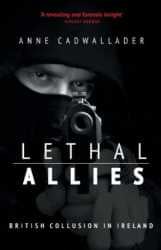One of the most important books about the dirty war fought in Northern Ireland during the 30 years between 1968 and 1998 has just been published.
Lethal Allies: British collusion in Ireland* offers "indisputable evidence of security forces collusion" with loyalist paramilitaries.
It alleges that members of the police force, the Royal Ulster Constabulary (RUC), and Ulster Defence Regiment (UDR), were part of a loyalist gang that killed more than 100 people in just one small area in the 1970s.

As I reported last week, the book's author, Anne Cadwallader, said: "It's truly ironic that as a journalist I could never have done this kind of journalism because no-one would have commissioned me."
Instead, she carried out the work after quitting journalism to join the human rights organisation, the Pat Finucane Centre, as a researcher.
It was there she met Alan Brecknell, who had carried out painstaking research into widespread collusion after investigating the controversial circumstances surrounding the 1975 murder of his father, Trevor.
Cadwallader quickly recognised the value of his work and she was able to dovetail it with documentary evidence from the Historical Enquiries Team (HET), a unit set up by the Police Service of Northern Ireland (PSNI) in September 2005 to investigate unsolved murders committed during the troubles.
Cadwallader's book reveals how RUC officers and members of the UDR were part of a gang operating from two farms in south Armagh and Tyrone. It was responsible for the deaths of 120 people between 1972 and 1976.
"It can be demonstrated beyond a reasonable doubt that there was systemic collusion in these cases," she said.
She relates a series of killings that point to collusion, such as the murders of four people in attacks on two pubs in Charlemont, Co Armagh, in May 1976 and an attack on the Catholic-run Rock Bar in Co Armagh, also in 1976.
The Guardian's Henry McDonald, in his report on the book, centres on the Rock Bar incident. He tells how only one serving police officer was found guilty of the attack, which the HET report said "beggars belief."
It described the original police inquiry into the attack as "unforgivable" and made a damning indictment in a document quoted by Cadwallader:
"A busy country pub frequented by honest, decent working people was a target for a sectarian attack; a member of the public in the street outside was callously gunned down without warning; a powerful explosive, wrapped in nail and metal fragments to ensure maximum numbers would be killed or maimed, is detonated at the door; the police investigation is cursory, ineffective and even fails to interview the only witness, who survived being shot down."
Another HET report also claimed that the RUC had advance knowledge of an attack in which two people died in August 1976 at the The Step Inn in Keady, Co Armagh.
According to the book, the RUC knew a bomb was being stored at a farmhouse owned by a serving police officer and asked the army to put it under surveillance. But the surveillance was lifted and the bomb was then used in the attack.
It further claimed that RUC Special Branch knew the identities of four people involved in the bombing, but that no arrests were made.
The noted Dublin-based journalist, Vincent Brown, has called Cadwallader's book "a revealing and forensic insight".
But will it be taken seriously by the British political class? Sadly, McDonald's report appeared online, but not in print, as he would surely have wished.
Though it will therefore be read by more people, because of the paper's higher digital audience, there is no doubt that - at present - what appears in print in national newspapers in Britain has a greater chance of producing a political effect.
Without pressure on the government, the likelihood of action being taken is remote. The families of at least two victims - 38-year-old Elizabeth McDonald and Gerard McGleenan, 22 - have lodged complaints with the Northern Ireland police ombudsman. Others may follow suit.
But what does Westminster have to say about British security forces collaborating with death squads in Northern Ireland?
More newspaper editors, especially those given to telling us how they require the maximum amount of freedom to hold power to account, should be headlining Cadwallader's disturbing book.
In fact, has any editor thought of serialising it? If not, why not? And why has the BBC's Belfast outfit not seen fit to make a documentary based on it?
*Lethal Allies: British collusion in Ireland by Anne Cadwallader (Mercier Press)
Sources: Private information/Newshound/BBC/The Guardian
Comments (…)
Sign in or create your Guardian account to join the discussion